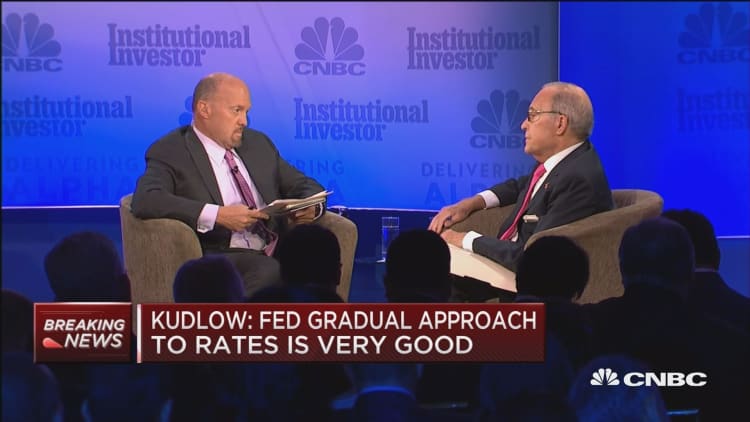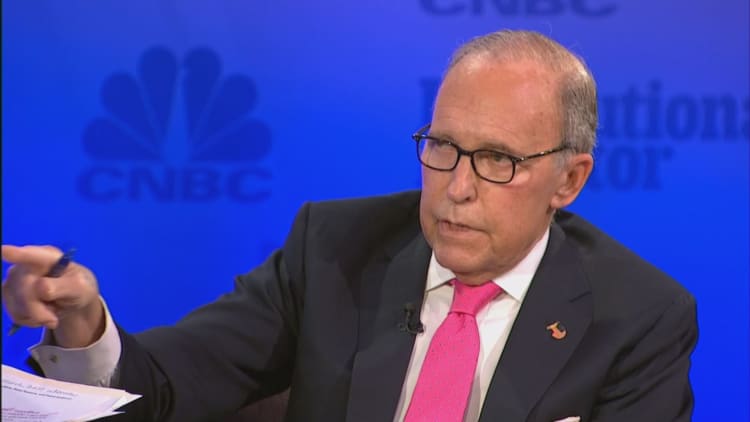The Commerce Department is opening an investigation into whether imports of uranium — the chemical element that fuels nuclear power — pose a risk to national security.
The new probe marks the Trump administration’s latest use of a 1962 trade law to scrutinize imports. President Donald Trump has placed tariffs on foreign steel and aluminum following an earlier investigation, and the Commerce Department is conducting a review into auto imports.
Commerce is taking action after two American uranium producers, Energy Fuels and Ur-Energy, petitioned the department to open a so-called Section 232 investigation into whether the dominance of imports in the U.S. uranium market raises national security concerns.
“Our production of uranium necessary for military and electric power has dropped from 49% of our consumption to 5%,” Commerce Secretary Wilbur Ross said in a statement. “The Department of Commerce’s Bureau of Industry and Security will conduct a thorough, fair, and transparent review to determine whether uranium imports threaten to impair the national security.”
Uranium also powers the Navy's nuclear submarines and aircraft carriers. However, the fleet runs on highly-enriched uranium, which the United States sources from its stockpile of weapons-grade material. The military will need new sources of fuel for naval purposes around 2060, according to a Department of Energy assessment.
Commerce said its investigation will examine the entire uranium sector, including mining, enrichment, defense and uses by industry. The department consulted with industry stakeholders, members of Congress and the departments of Defense and Energy prior to launching the probe.
Energy Fuels and Ur-Energy submitted their request to Commerce in January, arguing that imports of subsidized uranium from state-owned companies threatens to undermine national security.

"Despite uranium’s critical role in supporting clean electricity and national defense, imports of cheap, foreign state-subsidized uranium have swelled in recent years to the point that domestic suppliers currently provide less than 5% of our nation’s demand," the companies said in a statement.
The companies recommend setting a quota that would limit uranium imports and assure U.S. producers provide about 25 percent of the nation's supply. It is not certain Commerce would follow that recommendation.
Only 7 percent of the uranium delivered to U.S. nuclear power plants last year was produced in the United States. Nuclear power generated 20 percent of the nation's energy in 2017.
Last year, U.S. uranium concentrate production fell to its lowest level since 2004. The nation produced 2.44 million pounds, down from 43.7 million pounds in 1980, when output peaked, according to the U.S. Energy Information Administration.
Canada, Kazakhstan, Australia and Russia shipped most of the uranium used in power plants in 2016, according to EIA.
Concerns are growing that the Trump administration's use of tariffs and the several trade disputes it has opened with allies and rivals alike will crimp global economic growth.
On Tuesday, influential Republican Sen. Orrin Hatch said he may support legislation to limit President Donald Trump's authority over trade issues if he continues to impose tariffs.
Nuclear power plants under pressure
The Nuclear Energy Institute, the nuclear industry's trade association, on Wednesday urged the Trump administration to take action to maintain U.S. uranium supplies, but cautioned against moves that would harm nuclear power plants.
"We sympathize with the plight of uranium suppliers. However, NEI does not support the implementation of quotas as described in the petition. Potential remedies could put even more generating units at risk for premature closure, which would further soften the market for uranium," Maria Korsnick, president and CEO of NEI said in a statement.
More than half of U.S. nuclear reactors are currently losing money, with losses totaling $2.9 billion annually, according to a recent report by Bloomberg New Energy Finance.
The Trump administration is taking steps to put those plants on life support. Last month, Trump ordered U.S. Energy Secretary Rick Perry to "prepare immediate steps" to prevent any more nuclear reactors from shuttering.
A draft proposal shows Perry is considering using executive authority to force regional markets to buy enough electric power from coal-fired and nuclear plants to keep them open. In January, federal regulators unanimously rejected a previous proposal by Perry to subsidize coal and nuclear plants.
The nation's supply of nuclear fuel has grabbed headlines and stoked partisan fights in recent years. The political brouhaha has its roots in the Russian atomic energy agency Rosatom's purchase of Canada's Uranium One, which controls about 20 percent of U.S. uranium production capacity.
The deal was the subject of a New York Times investigation that detailed financial links between Uranium One and the Clinton Foundation. It also featured prominently in "Clinton Cash," a book funded by the conservative Government Accountability Institute, which was previously linked to former Trump deputy Steve Bannon.
Trump, whose campaign is under investigation for potential links to a Russian campaign to disrupt the 2016 presidential election, has frequently brought up the Uranium One incident, saying Hillary Clinton gave Russia 20 percent of the nation's uranium. At the time of the sale, Clinton led the State Department, one of several federal agencies that approved the transaction.
WATCH: Kudlow not a big fan of tariffs




